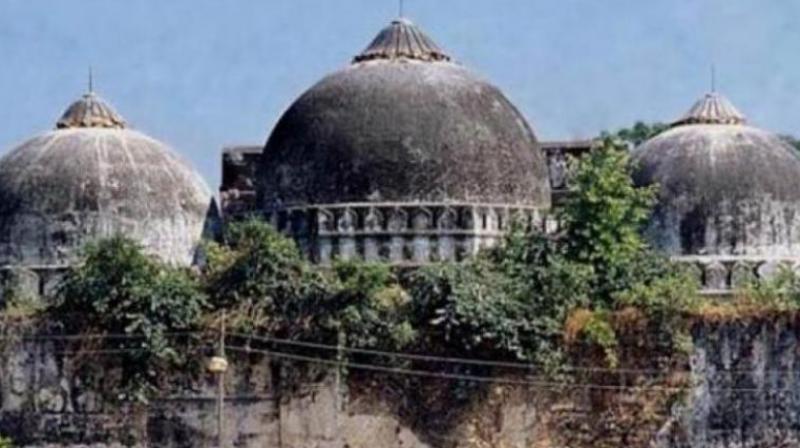Sunni Waqf Board may drop claim to disputed land in Ayodhya
 NEW DELHI : The Sunni Waqf Board has offered to drop its claim to the disputed temple-mosque site in Ayodhya and has no objection to the land being taken over by the government for a Ram Temple, a mediation panel of the Supreme Court has said in its report, according to sources.
NEW DELHI : The Sunni Waqf Board has offered to drop its claim to the disputed temple-mosque site in Ayodhya and has no objection to the land being taken over by the government for a Ram Temple, a mediation panel of the Supreme Court has said in its report, according to sources.
The primary Muslim litigant in the title dispute case has informed the Supreme Court that it is willing to drop its appeals in the matter – and its claims to the land on which the historic Babri Masjid stood for centuries before it was demolished by Hindutva activists and leaders in 1992 – provided the Centre is willing to guarantee that all other places of worship in India will be protected from similar encroachment.
The surprise development came on the last day of the hearings scheduled by the five judge-constitution bench of the Supreme Court. In virtually day-to-day hearings over the past few weeks, the bench, headed by Chief Justice Ranjan Gogoi, had heard arguments from the two Hindu litigants in the case – the Ramjanmabhoomi Nyas, controlled by the Vishwa Hindu Parishad, a front of the Rashtriya Swayamsevak Sangh, and the Nirmohi Akhara – as well as the Sunni Waqf Board
Gogoi retires in the middle of November and the bench is expected to deliver its judgment in the landmark case by then. According to informed sources, the Sunni Waqf Board and some but not all of the Hindu litigants have signed the settlement proposal, which has been submitted via the three-member mediation panel that the court had set up earlier this year.
Significantly, the VHP-backed Ramjanmabhoomi Nyas has not accepted the terms of the settlement. “Settlement has been filed. I cannot say more now,” a source familiar with the proceedings told The Wire on Wednesday morning.The court, however, continued with its hearings, and at the end of the day’s proceedings said it was reserving its judgment
Besides agreeing to give up its claim to the site of the razed Babri mosque, the Waqf Board has also asked that existing mosques in Ayodhya be renovated by the government. The Waqf board has offered to build a mosque at any other suitable place, sources have revealed on the report that could lead to a breakthrough in the 134-year-old Ram Janmabhoomi-Babri Masjid dispute.
The mediation panel report also says the Waqf Board can submit a list of ASI (Architectural Survey of India) mosques and a court-appointed committee can name those that can be used for prayers. The report calls for a National Institution for Harmony in Ayodhya, for which offers of land have reportedly come from Mahant Dharam Das and Shri Aurobindo Ashram of Pondicherry.
Details of the latest mediation effort emerged on a day the Supreme Court ended daily hearings on the dispute, saying: “Enough is enough”. Both Hindus and Muslims claim the land where the 16th century Babri mosque stood before it was brought down in December 1992 by Hindu activists who believed that it was built on the ruins of an ancient temple marking the birthplace of Lord Ram. The cataclysmic incident shook Indian politics and caused riots across the country.
Yesterday, senior lawyer K Parasaran, representing “Ram Lalla Virajman” or infant Lord Ram, argued: “There are 55-60 mosques in Ayodhya alone. But for Hindus, it is the birth place of Lord Ram…we can’t change the birthplace.”
The Waqf board’s offer has to be accepted by the other parties to the dispute for the solution to work out.It is not known whether the Nirvani Akhara, the Shankaracharya of Dwaraka and the Hindu Mahasabha have approved of the suggestion.
The mediation panel, comprising former Supreme Court judge FM Kalifulla, spiritual guru Sri Sri Ravishankar and senior advocate Sriram Panchu, started consultations with various groups in March.
The report was submitted by Justice Kalifulla in the morning but the Chief Justice of India Ranjan Gogoi did not mention it today. There is a possibility that the Supreme Court’s verdict, likely next month, will reflect the points in the mediation report.(With Agency Inputs ).

